A very wise person once told me, “The truth in people is not in what they say, it’s in what they do”. That would be my Auntie E, Canadian farm woman, first introduced here. Rural America clearly needed her homespun wisdom earlier this month, but I will spare you that digression. By the way, I can happily report that Auntie E seems to have fully recovered from her obvious derangement about the value of social media, which I stumbled upon in this post–but it’s an embarrassing episode for her, so I’d rather you didn’t read it.
Elon Musk’s SpaceX and Jeff Bezos’ Blue Origin are ostensibly similar ‘sideline’ businesses. Both are privately-owned aerospace companies commercialising space transport, but the similarity ends there.
SpaceX–the true deeds
- 45 years old
- founder of SpaceX and Tesla Motors
- earlier founding roles with PayPal, HyperLoop, OpenAI
- current net worth: $11.5B (Forbes)
- needs to know publicly articulating his theory on the human condition may hurt confidence in his ability to run his companies successfully
Elon Musk started SpaceX in 2002, a year before Tesla Motors (see sidebar), but after his earlier tech career success. SpaceX has managed to build rockets that have put unmanned space craft into Earth’s orbit and have actually connected to and re-supplied the ISS (International Space Station). A critical part of the economic viability of commercial aerospace companies is the safe re-landing and reuse of the booster rockets that propel the space craft with its payload. SpaceX needed five attempts to successfully re-land a rocket, so they’ve never had a surviving rocket to reuse. This September, an explosion at test launch destroyed the most recent commercial payload along with the rocket. But based on its success at being first to reach geostationary (high) orbit, SpaceX now has contracts with NASA (with Boeing as partner) and the US Air Force.
What SpaceX has done is fast and spectacular with lots of intriguing talk promoting its future and smoothing over the significant failures.
Blue Origin–the true deeds
- 52 years old
- founder of amazon.com
- current net worth of $71B makes him the world’s 5th wealthiest person (Forbes)
- needs to know Dr Evil wants his suit back in time for the next Austin Powers movie
Jeff Bezos started Blue Origin in 2000, six years after he started amazon.com (see sidebar). Blue Origin has focused on lower-level rocket launches and has not yet connected to the ISS. In all five attempts, the rocket has re-landed successfully and has been reused. No spectacular explosions, but because all flights have so far been suborbital, Blue Origin has no commercial contracts. The first orbital rocket was announced this September for launch by 2019.
What Blue Origin has achieved is steady and incremental success that is less-than-spectacular only because SpaceX has been first to hit the big targets.
My question is, “Will Elon be aboard SpaceX’s first manned flight in late 2017/early 2018?”
The real difference between SpaceX and Blue Origin? Their founders and the founding vision.
SpaceX–the telling vision
Elon founded SpaceX for the end purpose of starting a human colony on Mars, based on the belief that mankind needs a refuge from the kind of extraterrestrial impact that killed the dinosaurs [1]. The implicit odds of this catastrophic event happening are once every 4.4 billion years, so Elon’s giveback is clearly for some very future version of mankind. While most of us wait millennia for the final extraterrestrial event, wealthier humans can escape to Mars in 2025, presumably because the Earth will by then be irreparably messed up by human hands.
Blue Origin–the telling vision
Jeff founded Blue Origin for the purpose of allowing wealthier people the experience of near-space travel, and eventually, moving heavy and energy-intensive industry to near space, allowing us to make planet Earth more inhabitable for humans. Jeff’s giveback is clearly based on saving Earth for all humans, before it’s too late to do so.
These hugely successful men have big dreams. My dream is only a bit humbler. My dream is for the two of them to have tea with my Auntie E. In 20 minutes, or less, she would give us the definitive answer on whether mankind should follow Elon or Jeff for salvation. With the same sensible objectivity she uses to judge dairy cows at her annual agricultural fair.
So far, neither potential guest has accepted my invitation. And Auntie E isn’t getting any younger. In the meantime, I’ll follow Auntie E’s general advice–I’ll keep updating my comparative list of what these two space companies have done, and do, moving forward.
Notes and references:
- Never mind the scientifically-acknowledged and equally-plausible massive volcanic eruption theory, or the fact that not all dinosaurs died.
- The main image is SpaceX Falcon 9 rocket with payload ascending and Blue Origin New Shepard rocket descending. These are not to scale. Yes, so far, Elon’s rocket is bigger.
- Jeff Bezos image credit: Manjunath Kiran/AFP/Getty Images.
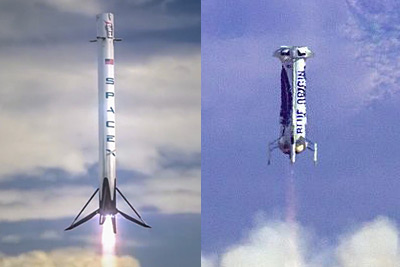
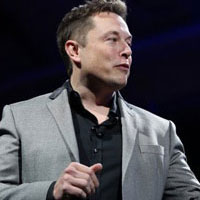
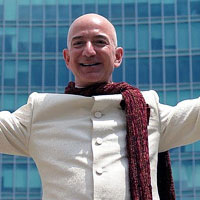
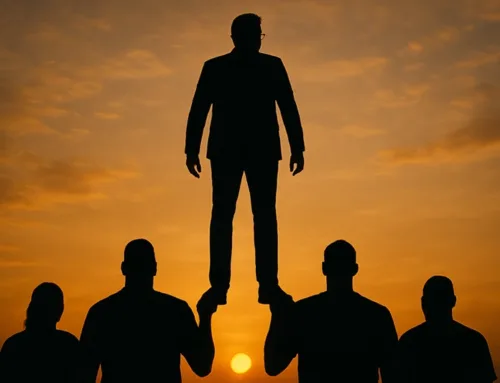

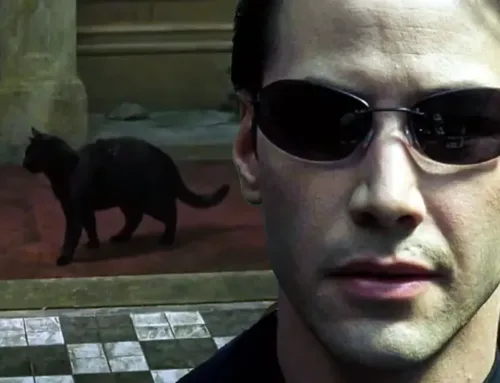


Elon Musk and another tech billionaire, Mark Zuckerberg, get into the former’s dystopian view of the future of mankind (and therefore, why we might need to go to Mars): https://www.theladders.com/p/24511/elon-musk-mark-zuckerberg-robots
Congratulations to Elon Musk and all the people of SpaceX on yesterday’s nearly flawless launch of Falcon Heavy! #falconheavy
Hummm… Jeff Bezos’ vision for humans in space has suddenly become much more like Elon’s. Now it’s mass colonisation. See: https://www.economist.com/finance-and-economics/2019/05/14/amazons-boss-reckons-that-humanity-needs-an-hq2
Of the world’s richest men, now only Bill Gates is interested in saving the Earth from disastrous human activity. Elon Musk has always been for extraterrestrial colonisation. Jeff Bezos went there around the time of his apparent mid-life crisis. Only Bill Gates has a plan to save the Earth with his recent manifesto, “How to Avoid a Climate Disaster”. It’s certainly optimistic, but more likely to succeed in its timeframe than Musk’s or Bezos’ colonisation plans. Most importantly, Gates’ plan saves everyone.